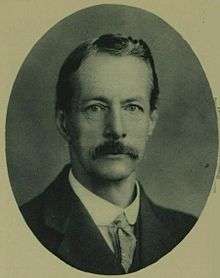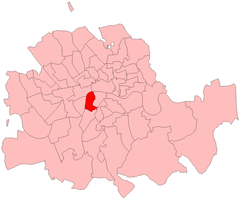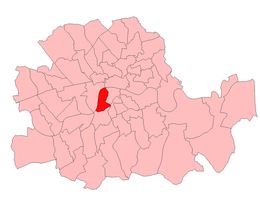Frank Briant
Frank Briant (30 November 1865[1] – 1 September 1934) was a radical[2] British Liberal Party politician who served as a Member of Parliament for Lambeth North. In addition he represented Lambeth on the London County Council and was a leading member of Lambeth Borough Council.

Background
He was born in Kennington to William and Susannah Briant.[3] He started work as a civil servant.[1] In 1887, he started working at the Alford House Institute for Workingmen and Lads. In religion, he was a Congregationalist.
Political career
He served for 10 years as Chairman of the Lambeth Board of Guardians. He was a Justice of the peace for London.[1] He was a member of Lambeth Borough Council, the London County Council and the House of Commons. He was first elected to Lambeth Council and was elected Chairman of the Council in 1899, a position he held for twenty years. He was elected as a Progressive Party member to the London County Council in 1905 representing Lambeth North.[4] He served as both a borough and county councillor through to the end of World War I. In 1912, he was selected as the Liberal prospective parliamentary candidate for Lambeth North but due to the outbreak of war; had to wait until the 1918 general election. He was comfortably re-elected to the LCC in 1913 suggesting that he may well have gained the parliamentary seat in a 1915 general election;

| Party | Candidate | Votes | % | ± | |
|---|---|---|---|---|---|
| Progressive | 2,370 | ||||
| Municipal Reform | 2,118 | ||||
| Municipal Reform | W. Gough-Cook | 2,105 | |||
| Labour | Francis Samuel Smith | 2,037 | |||
| Majority | |||||
| Progressive hold | Swing | ||||
| Municipal Reform gain from Labour | Swing | ||||
Despite his Unionist opponent receiving the 'coupon' letter of support from the Coalition Government he gained the seat from the Unionists. His election was one of only a handful of gains made by the Liberals at these elections.

| Party | Candidate | Votes | % | ± | |
|---|---|---|---|---|---|
| Liberal | Frank Briant | 7,326 | 62.3 | +15.8 | |
| Coalition Conservative | Sir William Henry Houghton Gastrell | 4,441 | 37.7 | -15.8 | |
| Majority | 2,885 | 24.6 | 31.6 | ||
| Turnout | 40.9 | -32.6 | |||
| Liberal gain from Conservative | Swing | +15.8 | |||
In 1919, due to the commencement of his parliamentary career, he stood down from the Chairmanship of Lambeth Council, and retired from the London County Council.
He retained his seat in the House of Commons at every subsequent election
| Party | Candidate | Votes | % | ± | |
|---|---|---|---|---|---|
| Liberal | Frank Briant | 8,132 | 43.1 | -19.2 | |
| Conservative | Ernest Roy Bird | 7,362 | 39.1 | +1.4 | |
| Labour | Barbara Bodichon Ayrton-Gould | 3,353 | 17.8 | n/a | |
| Majority | 770 | 4.0 | -20.6 | ||
| Turnout | 62.2 | +21.3 | |||
| Liberal hold | Swing | -10.3 | |||
| Party | Candidate | Votes | % | ± | |
|---|---|---|---|---|---|
| Liberal | Frank Briant | 9,036 | 48.5 | +5.4 | |
| Conservative | Ernest Roy Bird | 5,509 | 29.6 | -9.5 | |
| Labour | F. Hughes | 4,089 | 21.9 | +4.1 | |
| Majority | 3,527 | 18.9 | +14.9 | ||
| Turnout | 59.8 | -2.4 | |||
| Liberal hold | Swing | +7.5 | |||
| Party | Candidate | Votes | % | ± | |
|---|---|---|---|---|---|
| Liberal | Frank Briant | 7,943 | 37.2 | -11.3 | |
| Labour | George Russell Strauss | 7,914 | 37.1 | +15.2 | |
| Conservative | J. Lazarus | 5,488 | 25.7 | -3.9 | |
| Majority | 29 | 0.1 | -18.8 | ||
| Turnout | 31,866 | 67.0 | +7.2 | ||
| Liberal hold | Swing | -13.3 | |||
During the 1924–29 parliament which was dominated by a Unionist majority, Briant worked closely with a group of radical Liberal MPs that included William Wedgwood Benn, Percy Harris, Joseph Kenworthy and Horace Crawfurd to provide opposition to the government.[7] He lost his seat to Labour in the 1929 General Election
| Party | Candidate | Votes | % | ± | |
|---|---|---|---|---|---|
| Labour | George Russell Strauss | 11,264 | 43.8 | +6.7 | |
| Liberal | Frank Briant | 10,722 | 41.8 | +4.6 | |
| Conservative | Clyde Tabor Wilson | 3,691 | 14.4 | -11.3 | |
| Majority | 542 | 2.0 | 2.1 | ||
| Turnout | 66.2 | -0.8 | |||
| Labour gain from Liberal | Swing | +1.1 | |||
In 1931 he returned to municipal politics and was re-elected to the London County Council again representing Lambeth North.[8] Later that year he regained his Lambeth North seat in the House of Commons, defeating the Labour candidate at the 1931 General Election
| Party | Candidate | Votes | % | ± | |
|---|---|---|---|---|---|
| Liberal | Frank Briant | 16,368 | 65.1 | +23.3 | |
| Labour | George Russell Strauss | 8,766 | 34.9 | -8.9 | |
| Majority | 7,602 | 30.2 | 32.2 | ||
| Turnout | 64.6 | -1.6 | |||
| Liberal gain from Labour | Swing | +16.1 | |||
He remained a London County Councillor up until the Match 1934 elections.[8] He continued to represent Lambeth North in the House of Commons until his death. He died on 1 September 1934 at the Alford House Institute for Workingmen and Lads of which he had been the superintendent for 47 years.[9]
See also
External links
- Portraits of Frank Briant at the National Portrait Gallery, London

- Hansard 1803–2005: contributions in Parliament by Frank Brian
- Leigh Rayment's peerage page – https://web.archive.org/web/20180914195349/http://www.leighrayment.com/commons/Lcommons1.htm
- POLITICS & PEOPLE OF LONDON – London County Council 1889–1965: https://books.google.com/books?id=A1yI5GjsmNsC&printsec=frontcover&dq=The+Story+of+the+London+County+Council&hl=en&sa=X&ei=sczwUrbpNaGS7Aa12YGICg&ved=0CDEQ6AEwAA#v=onepage&q&f=false
References
- Debrett's House of Commons and the Judicial Bench. London: Dean & Son Limited. 1922. p. 21.
- The Downfall of the Liberal Party by Trevor Wilson
- 1871 England Census
- London County Council election in North Lambeth, The Times, 18 December 1905, p.12
- London Municipal Notes, 1913
- Craig, Frederick Walter Scott (1969). British Parliamentary Election Results 1918–1949. Chichester: Parliamentary Research Services. ISBN 0-900178-06-X.
- Forty Years in and out of Parliament by Sir Percy Harris
- 'BRIANT, Frank', Who Was Who, A & C Black, an imprint of Bloomsbury Publishing plc, 1920–2007; online edn, Oxford University Press, Dec 2007 accessed 4 Feb 2014
- The Times, 3.9.34
| Parliament of the United Kingdom | ||
|---|---|---|
| Preceded by Sir William Houghton-Gastrell |
Member of Parliament for Lambeth North 1918 – 1929 |
Succeeded by George Strauss |
| Preceded by George Strauss |
Member of Parliament for Lambeth North 1931 – 1934 |
Succeeded by George Strauss |